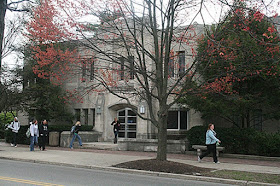BEYOND WINTER: The Irrelevant Memories of An Old Man—THE IMPORTANCE OF BEING ERNIE [T, 5-27-25]
Yesterday was Memorial Day, and I am thinking about my childhood hero, who was killed in WWII, Ernie Pyle.
His writing as a WWII
correspondent endures, much better than that of Ernest Hemmingway. Ernie’s
column on The Death of Captain Waskow may be the single most famous
piece of war writing ever.
I wanted to be a writer like Ernie, because he wrote about my beloved uncles.
Bob and Randall and Mike McFarland were in the Army. Jesse Pond was in the Navy Air Force. Johnny Pond was a Marine. All the folks I knew—in person and on air—said that Ernie Pyle told the truth as he wrote about the common soldier. To me, common soldiers meant my uncles. My first memories were of wanting to be Ernie Pyle. I was too young to be a solider, but I figured I could write about them. I could tell the stories of men like my uncles.
My close relationship with my uncles was born out of The Great Depression. Until I was four, we lived with the McFarland uncles most of the time, because my father couldn’t get a job. Actually, we lived with Grandpa and Grandma Mac, in a big old farm house on the edge of Oxford, OH, that my mother named Cedar Crest, but Bob and Randall and Mike still lived there, too. They could not marry or move out on their own because they could not get jobs, either. Their room was a side porch. I thought it was wonderful. They were great playmates. Uncle Randall, especially, was my main companion and care giver.
We moved to Indianapolis
when I was four, because my father found a job there. When Uncle Randall and
his brand-new bride, Gertrude Robbins, came through Indianapolis on their
honeymoon, headed for California, where he was to report for South Pacific duty,
on a train crowded with so many soldiers than nobody had a sleeping berth and
some even slept in the aisles, I took Uncle Randall to school with me [1], in
his lieutenant’s uniform, to show him off.
World War II was the war of my childhood, the context for everything I understood about life—turning off all the lights for air raid drills, knowing the meaning of the color of the star flags in the windows of the houses on the streets I walked, growing a “victory garden,” saving tin cans and grease to help “the war effort,” buying Victory Bonds [Grandma Mac bought one for me that I later cashed in to get a used clarinet so I could be in the band], going without because “the boys overseas” needed stuff more than I did, singing rude songs and telling rude jokes about the Krauts and Japs, singing the stirring songs of every branch of the military, learning that America was always right, but also learning to hate injustice and racism and war, especially in a country that prided itself on being the beacon and model of freedom for the world, and, most importantly, we were one people, united in the defense of democracy and the defeat of Nazism and fascism.
To make my career and
personal goal even better, Ernie and I were both Hoosiers. He had even been the
first editor of the Indiana University [IU] school newspaper, The Indiana Daily
Student. Naturally, I worked up to being editor of my high school paper, Oak
Barks, and went on to enroll as a journalism student at IU, in the Ernie
Pyle School of Journalism, in its eponymous building, with the idea of
replicating Ernie’s career. [2]
I attended, with my wife
and daughters, the dedication of Ernie’s childhood home in Dana, IN, when it
was designated as a State Historic Site in 1976.
My dream, of being Ernie, was not fulfilled, since I got sidetracked into preaching. But I never lost that feeling that Ernie and I somehow belonged together, maybe because I also got to tell truth, to tell the same kinds of stories in the pulpit that Ernie wrote in his columns. A different war, but we both told the stories.
John Robert McFarland
1] Lucretia Mott Public
School # 3, on Rural Street.
2] When I went to IU, The
Ernie Pyle School of Journalism had its own building. Journalism has now been
subsumed into The Media School, which resides in Franklin Hall, which was the
main library in my day. Ernie Pyle Hall, because of its location in the center
of campus, beside the Memorial Union building, has been turned into the IU
Welcome Center. A statue of Ernie, sitting at his typewriter, now stands near
the entrance of Franklin Hall.










No comments:
Post a Comment